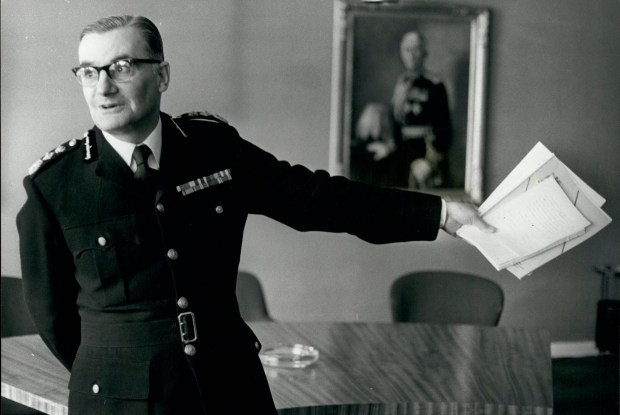On Sunday a drama began with ED905 being stolen by an OCG who’d faked an RTC that required IR, little realising that they had a UCO in their midst. So yes, Line of Duty (BBC1) is back in all its jargon-laden glory — and, judging from the first episode, it’s lost none of its ability to grip either.
For those a bit rusty on their police abbreviations, that opening scene featured the female member of an organised crime group pretending she’d crashed her car with a baby inside, causing the woman in charge of a passing police convoy to stop and help. The rest of the gang then appeared in regulation Line of Duty balaclavas, killed three officers and drove off with the lorry-load of heroin the police were escorting.
When the news reached the anti-corruption unit AC-12, the initial reaction of boss Ted Hastings (Adrian Dunbar) was naturally to give us his first ‘Mother of God!’ of the series. He also realised the gang must have had inside information, not just about the route, but about the fact that the officer in charge was a mother herself — the thinking apparently being that no bloke or childless woman would bother to stop and save the life of a child. Before long, the insider had been found and it was time for the first of those trademark interviews in which lines such as ‘JLM5 can be viewed in image 11’ become weirdly dramatic.
For a while, in fact, I did wonder whether Line of Duty, now in its fifth series, might end up straying into self-parody — always a somewhat unfair danger in a show as distinctive as this. But once the thrills were piling up with their customary ferocity, such chin-stroking seemed entirely beside the point (and anyway there wasn’t time).
Sunday’s episode duly ended with one of the regular characters bleeding out. Yet even this wasn’t the biggest twist of the last five minutes, because that came with the revelation of which member of the OCG was the UCO — or undercover officer to you and me. Meanwhile the extended tease continued that Hastings, on the face of it the world’s most morally upright man, might be a baddie himself. There are also some terrific guest stars (for now at least), led by Stephen Graham, who confirms that he’s one of the best menace-exuders in the business.
Over the next five weeks, the social pressure to regard Line of Duty as unmissably exciting may come to feel almost like bullying. But if that makes you want to take a noble stand against the mob by avoiding the whole thing, my advice would be not to. In this case, I’m afraid, the mob might well be right.
In Jack the Ripper: The Case Reopened (BBC1, Thursday), Emilia Fox used all the criminological knowledge she’s built up by being an actor in an implausible crime show to investigate the most famous cold case of them all. Luckily, she did have several experts to help — and to marvel at, however banal or speculative their conclusions.
Expert-in-chief was Professor David Wilson, serial-killer specialist and utter TV pro — as you could tell from his willingness to pretend he didn’t know much about the Ripper murders until Emilia read about them on her tablet. Still, once he did find out, his expertise soon revealed itself. It seems, for example, that dismembering a woman’s body and pulling out her intestines is ‘disturbing behaviour’. He further explained that the Ripper was ‘process-focused’, not ‘act-focused’ — which turned out to be a fancy way of saying that he didn’t just kill his victims, he also dismembered them.
And that of course was the trouble. Despite Emilia’s increasingly desperate assertions to the contrary, the programme didn’t really have anything new to say. At one point, to her great excitement, it exactly recreated the room in which the last of the victims was killed, complete with red spray-paint for blood. But what made this a useful exercise rather than, say, staggeringly pointless never became clear — although another expert was inspired to suggest that the Ripper may have mutilated the victim’s face so as to ‘disfigure her’.
We also met a ‘geoprofiler’, who used some flashy electronics to plot the crime scenes on a map, from which Emilia urged her to deduce that Jack was a local man. ‘It’s absolutely possible,’ the geoprofiler replied — by my reckoning, a pretty precise synonym for ‘definitely maybe’. (And besides, as we’d already learned, Whitechapel had 78,000 local people at the time.)
By the end, even Emilia appeared to lose heart, greeting Wilson’s proposal for the murderer’s identity with rather more qualified excitement. ‘It’s as definitive as we could hope for in a case that’s over 130 years old!’ she declared. Or, in other words, not very definitive at all.
Got something to add? Join the discussion and comment below.
Get 10 issues for just $10
Subscribe to The Spectator Australia today for the next 10 magazine issues, plus full online access, for just $10.
You might disagree with half of it, but you’ll enjoy reading all of it. Try your first month for free, then just $2 a week for the remainder of your first year.














Comments
Don't miss out
Join the conversation with other Spectator Australia readers. Subscribe to leave a comment.
SUBSCRIBEAlready a subscriber? Log in